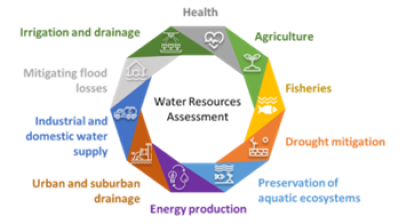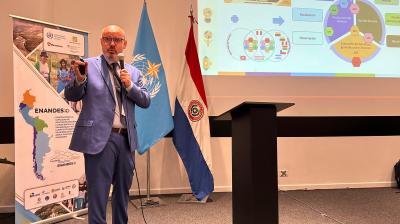Water and climate action go hand in hand

These were the key messages of a Call to Action backed by the World Meteorological Organization (WMO) issued at COP28. Water and Climate Leaders said that water action must go hand in hand with climate action because water is part of the solution to climate change and not just a problem.
It called on governments to ‘wake up to water' in their national climate policies and their global efforts to reduce greenhouse gas emissions and stabilise the climate.
Countries must work together to achieve alignment of water and climate policies, provide mutual support through sharing of data, experiences and ideas and mainstream water into all current and relevant climate programmes, said the declaration.
“Achieving climate goals is fundamentally dependent on sustainable water management just as achieving water goals in fundamentally dependent on stabilising the global climate through success in reducing greenhouse gases,” said WMO Secretary-General Prof. Petteri Taalas.
WMO convened the Water and Climate Coalition because the impacts of climate change are often felt through water – more intense and frequent droughts, more extreme flooding, more erratic seasonal rainfall and accelerated melting of glaciers – with cascading effects on economies, ecosystems and all aspects of our daily lives.
Currently, 3.6 billion people face inadequate access to water at least a month per year and this is expected to increase to more than 5 billion by 2050. Water-related hazards are on the increase. Over 100 countries are not on track to have sustainably managed water resources by 2030.
Almost 75 percent of all disasters were water related in the past 20 years, with at least 1.6 billion people affected by floods and 1.4 billion by droughts) and economic damage of almost US$700 billion.
One important preparedness measure for combating the water-related disasters is to have effective and tailored multi-hazard early warning systems. WMO is committed to support the implementation of the UN Early Warnings for All initiative, through observations, monitoring and forecasting of weather and water-related hazards like floods and droughts.
Water and Climate Mitigation
Water is a major part of the solution to climate change.
Preliminary estimates from a new study presented at COP28 provided preliminary estimates of the water requirements of mitigation measures. This information is intended to raise awareness of the critical links between the availability of water and implementation of the Paris Agreement climate objectives.
This includes, for instance, the water required for clean energy measures such as liquid biofuels, wind and solar, hydrogen and hydropower as well as for forests and wetlands and other natural systems to absorb more carbon.
At the global scale, by 2030 just the clean energy mitigation measures considered are estimated to need around 900 cubic kilometres of water annually, which equates to approximately a third of the water withdrawn by irrigation globally, according to preliminary results of the study.
New freshwater requirements for clean energy, sequestration and other Paris Agreement measures will be offset to some extent by less water being required from the ‘old energy system’ as the world transitions towards a clean energy future. They will also be offset to the extent that sea water or brackish water can be substituted in a cost effective and environmentally acceptable manner.
Poorly managed wastewater, and water in wetlands, and artificial reservoirs and irrigation systems are also a major source of direct emissions of greenhouse gases, especially methane and nitrous oxide. Improved management of these waters will also be critical towards emission reduction targets globally, says the study.
The study is being prepared by the UN-Water Expert Group on Water and Climate Change Co-coordinated by WMO in partnership with the International Universities Climate Alliance.
Call to Action
The Call to Action from the Water and Climate Leaders envisages concrete and practical action which will make a difference on the ground, through policy alignment, mutual support and mainstreaming of water into all climate processes.
Policy alignment
Modifying national water laws to require that water policies and measures contribute to national climate mitigation and adaptation goals, and that the water needs of climate mitigation and adaptation activities are routinely identified and considered in water allocation decisions.
Mutual support
Sharing with other countries experience with mitigation measures and freshwater requirements.
Jointly (with other countries) preparing principles for climate adaptation that allow for more extreme water events and shortages.
Assisting other countries with technologies and management measures for improving reservoir design and operation to reduce both evaporation and emissions and allow for energy generation.
Mainstreaming
Working together to achieve alignment of water and climate policies, provide mutual support through sharing of data, experience and ideas and mainstream water into all current and relevant UNFCCC work programs across scales, and at the country level in nationally determined contributions.









